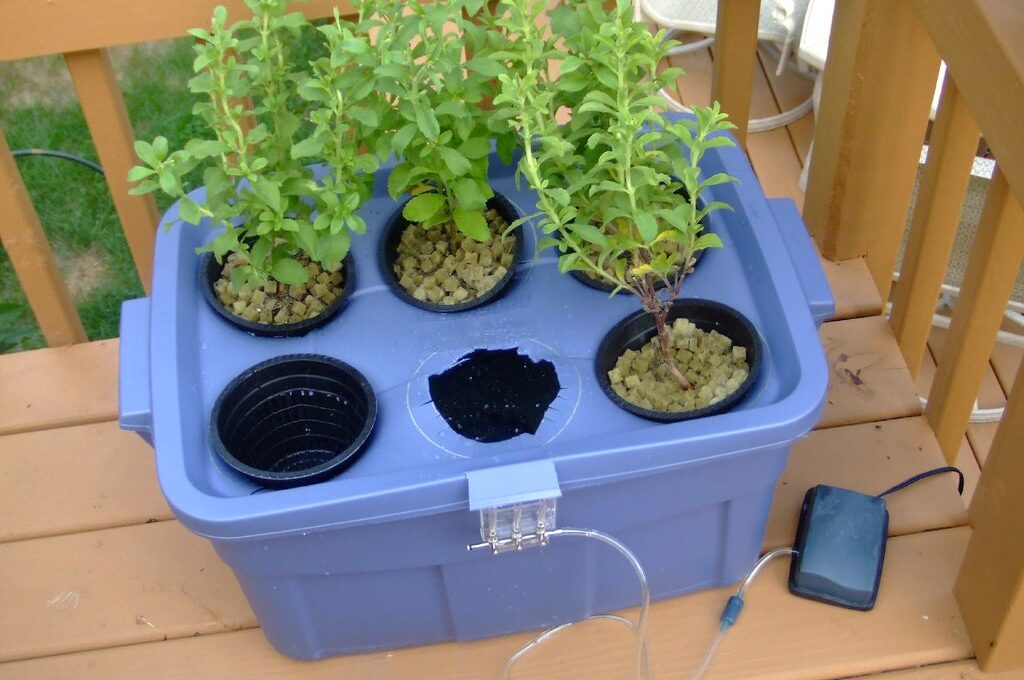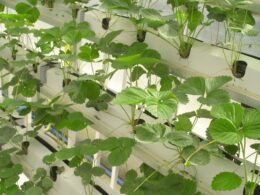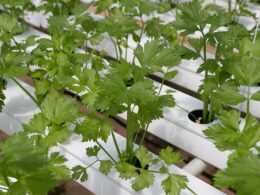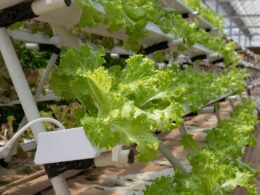Have you ever wondered if hydroponic plants taste different from traditional soil-grown plants?
Hydroponic growing methods involve growing plants in a nutrient-rich solution without soil, which may raise questions about the taste and quality of the resulting produce.
While some may argue that hydroponic plants have a different taste, others argue that there is no significant difference in taste between hydroponically grown plants and soil-grown plants.
It’s important to understand the different factors that may affect plant taste in hydroponic growing methods. These factors include the type of nutrient solution used, the pH levels of the solution, the lighting and temperature conditions, and the genetics of the plant itself.
Additionally, the taste perception of individuals may vary, which can also affect whether or not hydroponic plants are perceived to taste different.
Let’s delve deeper into the factors that may affect plant taste in hydroponics and explore the research on this topic.
Understanding Hydroponic Growing Methods
You’ll learn about how to grow plants without soil and instead using nutrient-rich water solutions in a controlled environment. This method of growing is known as hydroponics.
Hydroponic growing has several benefits compared to traditional soil-based methods. Firstly, hydroponic plants grow faster because they receive a constant supply of nutrients and water. This results in higher yields and faster harvest times.
In addition, hydroponic growing is more water-efficient than traditional soil-based methods. Hydroponic systems recycle water, so there is less wastage compared to traditional methods where water can seep through the soil.
Furthermore, hydroponic growing eliminates the need for pesticides and herbicides, resulting in healthier and pesticide-free produce.
Overall, hydroponic growing has several advantages compared to traditional soil-based methods. It is more efficient, faster, and produces healthier produce. By using hydroponics, you can ensure that your plants receive the exact nutrients they need, resulting in tastier and more flavorful produce.
Factors that Affect Plant Taste
As you explore the factors that can influence the flavor of your greens, imagine a plant that’s been given the perfect balance of nutrients, light, and oxygen. Hydroponic plants can be just as tasty as their soil-grown counterparts, but there are some factors to consider.
One such factor is the difference between soil and water. Plants grown in soil may have a slightly earthy taste due to the minerals and microorganisms present in the soil. On the other hand, hydroponically grown plants may have a cleaner taste since they’re not exposed to soil-borne diseases and pests.
Another important factor to consider is nutrient levels. Hydroponic systems allow for precise control of nutrient levels, which can result in plants with a more consistent flavor. In soil, nutrient levels can vary depending on factors such as weather, soil quality, and fertilization practices. However, it’s important to note that too much of a good thing can be detrimental to flavor. Over-fertilization can lead to an unbalanced flavor or even a metallic taste.
In addition to soil vs. water and nutrient levels, other factors such as lighting and temperature can also affect the flavor of hydroponic plants. For example, plants grown under LED lights may have a slightly different flavor compared to those grown under traditional fluorescent lights.
Ultimately, the flavor of hydroponic plants can be just as delicious as soil-grown plants, but it depends on a variety of factors. With proper care and attention to these factors, you can enjoy delicious and healthy greens from your hydroponic garden.
Does the Easiness of Growing a Plant Hydroponically Affect its Taste?
Growing a plant hydroponically offers numerous benefits, including the ability to control the growing environment and boost productivity. However, does the easiness of growing a plant hydroponically affect its taste? While technique plays a crucial role, the specific plant chosen also matters. Interestingly, the easiest hydroponic plant to grow may not necessarily yield the most flavorful result, as taste is influenced by various factors such as genetics, maturity, and overall care.
Studies on Hydroponic Plant Taste
Get ready to discover some interesting findings about how the flavor of your hydroponically grown greens can be influenced by various factors. While there is a common belief that hydroponic plants taste different from those grown in soil, there is little scientific evidence to support this claim. However, studies have shown that the taste of hydroponic plants can be affected by several factors such as the type of nutrient solution used, lighting conditions, and the plant variety.
Comparative analysis and taste testing techniques have been used to compare the flavor of hydroponic and soil-grown plants. In a study conducted by the University of Arizona, researchers found that hydroponic lettuce grown with a nutrient solution containing more calcium and less potassium had a stronger and more desirable taste than those grown with the opposite ratio. Another study by the University of Florida revealed that hydroponic tomatoes grown under low light conditions had a sweeter taste compared to those grown under high light conditions.
In addition, the plant variety can also play a role in the taste of hydroponic plants. For example, a comparative analysis of hydroponic and soil-grown basil conducted by researchers at the University of Mississippi found that hydroponic basil had a lower concentration of essential oils compared to soil-grown basil, resulting in a milder taste. Overall, while hydroponic plants may not necessarily taste different from soil-grown plants, the taste can be influenced by several factors and can even vary within different plant varieties.
Differences in Taste Perception
It’s fascinating how our perception of taste can vary based on factors such as texture, color, and aroma, ultimately influencing our enjoyment of food. When it comes to hydroponic plants, there are subjective preferences that can affect how people perceive their taste. Some individuals report that hydroponic plants have a milder, less bitter taste than their soil-grown counterparts, while others claim the opposite.
Cultural influences also play a role in taste perception, as different cuisines may highlight certain flavors over others. Here are four factors that can influence taste perception when it comes to hydroponic plants:
-
Texture: The texture of a plant can affect how it is perceived in the mouth. Hydroponic plants may have a different texture than soil-grown plants due to differences in water and nutrient availability.
-
Nutrient composition: The nutrient solution used in hydroponics can affect the taste of plants. For example, a higher nitrogen content may result in a more bitter taste.
-
Aroma: A plant’s aroma can influence its perceived taste. Hydroponic plants may have a different aroma than those grown in soil due to differences in growing conditions.
-
Cooking method: The way a plant is cooked can affect its taste. Hydroponic plants may require different cooking methods than soil-grown plants due to differences in texture and nutrient composition.
Overall, taste perception is a highly subjective experience that can be influenced by various factors. When it comes to hydroponic plants, there may be differences in taste perception compared to soil-grown plants, but this can vary depending on individual preferences and cultural influences. Whether you prefer the taste of hydroponic plants or not, they offer a unique and sustainable option for growing fresh produce.
Conclusion: Do Hydroponic Plants Taste Different?
If you’re curious about how the taste of your fresh produce can vary based on growing methods, you won’t want to miss this conclusion. Many people wonder if hydroponic plants taste different than soil-grown plants. After all, hydroponic plants grow in a nutrient-rich water-based solution, while soil-grown plants receive nutrients from the soil.
The answer is that hydroponic plants can taste different, but it ultimately depends on the plant and how it was grown. Some chefs prefer the taste of hydroponic plants because they believe they have a cleaner, more consistent flavor. Others argue that soil-grown plants have a deeper, more complex taste due to the nutrients and microorganisms present in the soil.
It’s important to note that taste is highly subjective, and what one person prefers may not be the same for another. Ultimately, it’s up to individual taste preferences and how the plant was grown.
In conclusion, the taste of hydroponic plants can vary from soil-grown plants, but it’s not a clear-cut answer. Taste is subjective, and it ultimately depends on the plant and how it was grown. If you’re interested in trying hydroponic plants, it’s worth experimenting to see if you prefer the taste. However, if you’re a fan of soil-grown plants, there’s no reason to switch unless you want to try something new.
Frequently Asked Questions
What are the benefits of growing hydroponic plants compared to traditional soil-based methods?
Looking to grow your own produce? Consider vertical farming using hydroponic techniques for a sustainable agriculture solution.
Compared to traditional soil-based methods, hydroponic plants have several benefits. They use less water, require less space, and can grow faster. Additionally, hydroponic plants are less prone to pests and diseases, which can reduce the need for harmful pesticides.
By optimizing the environment, you can grow high-quality produce that is free from soil-borne contaminants. So, whether you’re growing herbs, vegetables, or fruits, hydroponic plants offer a safe and efficient solution for your gardening needs.
How does the taste of hydroponic plants vary depending on the specific nutrient solution used?
If you’re curious about the taste of hydroponic plants, it’s important to note that the nutrient solution used can have a significant impact on the flavor. Different nutrient variations can produce different flavors in the same plant, so taste testing is essential to determine which solution produces the desired taste.
While some hydroponic plants may taste slightly different than their soil-grown counterparts, many people find that hydroponic plants have a fresher, more intense flavor due to their ability to absorb nutrients more efficiently.
So, if you’re looking to experiment with the taste of your homegrown produce, try playing around with different nutrient solution variations and see what flavors you can create!
Are there any negative effects on plant taste when using artificial lighting in hydroponic systems?
When it comes to hydroponic plants, lighting can have an impact on taste perception. Artificial lighting is often used in hydroponic systems, but it’s important to be aware of the potential negative effects on plant taste.
Studies have shown that certain types of lighting can alter the flavor and aroma of plants, which can ultimately affect the taste of the end product. While there are ways to mitigate these effects, it’s crucial to consider the impact of lighting on plant taste when setting up a hydroponic system.
So, if you’re looking to grow hydroponic plants with optimal taste, it’s worth taking the time to research and select the right lighting options for your setup.
Can hydroponic plants be grown without the use of pesticides or other chemicals?
Looking for natural alternatives and sustainable solutions for hydroponic systems? Organic hydroponics may be feasible for those wanting to grow plants without the use of pesticides or other chemicals.
While it may not be easy, you can find natural alternatives to synthetic chemicals that can harm the environment and your health. Some organic hydroponic techniques include using beneficial insects, compost tea, and non-toxic materials for your system.
By using these methods, you can ensure that your plants are healthy and safe to eat, without sacrificing the quality of your harvest. With a little research and experimentation, you can create an organic hydroponic system that is both sustainable and effective.
Are there any notable differences in the nutritional content of hydroponic plants compared to traditionally grown plants?
When it comes to the nutritional content of hydroponic plants versus traditionally grown plants, there is a noticeable difference. Nutritional comparison studies have shown that hydroponic plants can contain higher levels of certain nutrients, such as vitamin C and beta-carotene. Additionally, hydroponic plants are typically grown without the use of harmful pesticides or chemicals, making them a safer and healthier option for consumption.
However, when it comes to flavor profile, there isn’t necessarily a significant difference between hydroponic and traditionally grown plants. While some may argue that hydroponic plants lack the distinct earthy taste of soil-grown plants, others find that the flavor is just as good, if not better.
Ultimately, whether you prefer the taste of hydroponic or traditionally grown plants is a matter of personal preference.
Conclusion
So, do hydroponic plants taste different? The answer is not a simple yes or no.
While some studies have shown that hydroponic plants can have a different taste profile due to the absence of soil, other factors such as nutrient levels and light exposure can also impact taste.
Ultimately, taste perception is subjective and can vary from person to person. Some may not notice a difference in taste between hydroponic and soil-grown plants, while others may have a preference for one over the other.
The best way to determine if hydroponic plants taste different is to try them for yourself and see if you notice a difference.








